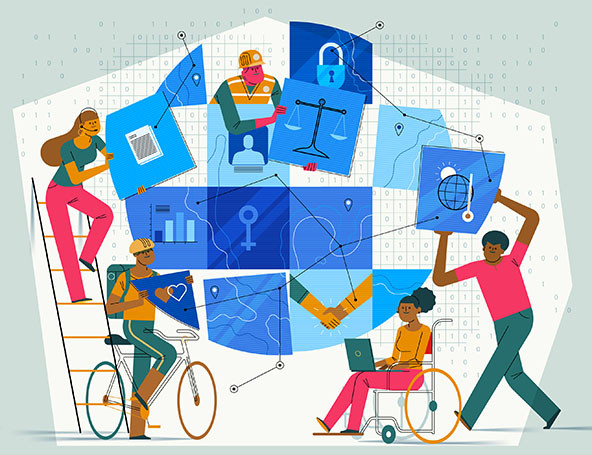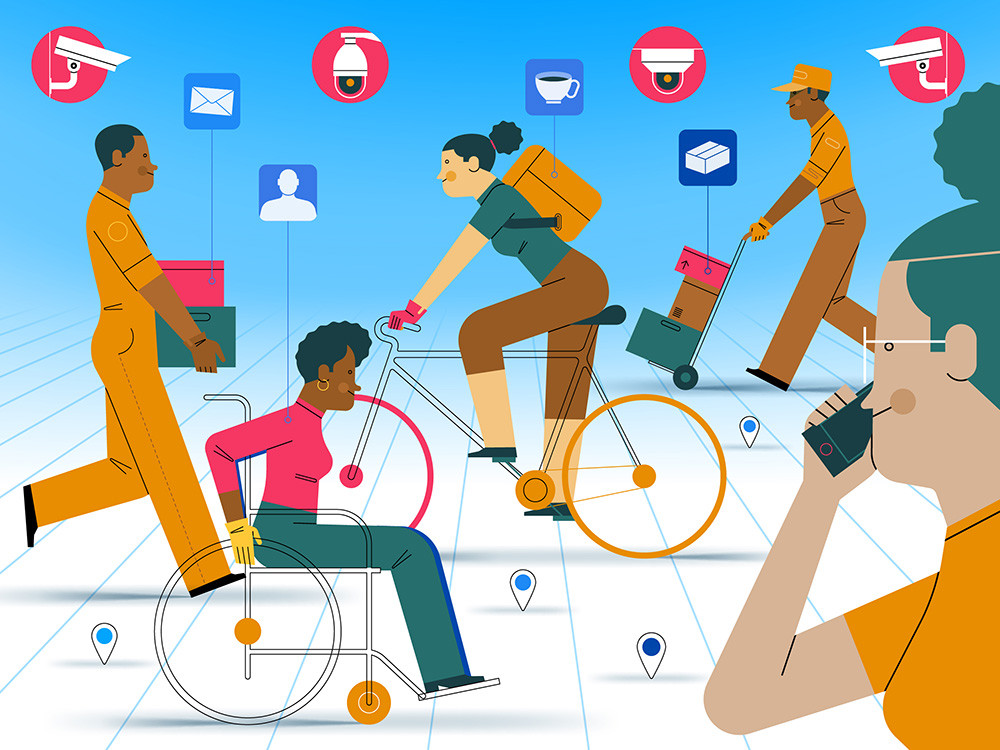 (Illustration by Hugo Herrera)
(Illustration by Hugo Herrera)
The digital economy is not working.
Democracy, freedom, and prosperity were the original promises of the internet. The world wide web was a game changer; people could now collaboratively build and create the world they desired. The gains would be universal, and in the new internet economy, everyone would have a place. Those who faced barriers in the offline world along the lines of gender, race, ethnicity or ability would find new opportunities. Indeed, these digital technologies would enable people to transcend the geographic boundaries that constrained their ability to pursue the lives they valued, enabling them to acquire more social, economic, and political power.

However, current reality is miles apart from that vision. In place of a democratized world wide web, we live in a winner-take-all digital economy, where the gains of the winners only get larger and the losers are progressively more immiserated. A level playing field—as promised by tech founders and investors alike—has failed to materialize. The challenges working people have long faced have been compounded in the digital economy. Indeed, promises of economic mobility, access, and flexibility which underpinned digital imaginaries of future work and security ring hollow. Disruptions in the world of work have instead delivered economic precarity, employer overreach, and the normalization of endless hustle for many. Platform work has calcified structural inequalities around the world, particularly relegating women workers, especially from the Global Majority World, to the lowest labor market segments. The digital economy thus has not only failed to deliver, but has exploited racial/ethnic, gender, and geopolitical hierarchies in the process.
How Tech Moves Fast and Breaks Workers
In 2021, IT for Change, with support from the Ford Foundation, undertook a major study of the digitization of the economy to try to understand how the internet has affected work and workers’ rights. We spoke with more than 80 people, representing workers, scholars, unions, the private sector, civil society, philanthropies, and multilateral agencies. Across those interviews, we heard again and again about a set of interlocking problems: that the gains from restructuring the global value chain have brought few rewards for workers while reversing labor rights won generations ago; that companies have amassed inordinate fortunes and ever greater power while workers are left disenfranchised, precarious and atomized; that the rapidly emerging digital economy is driving systemic changes, from increased labor displacement to unequal development trajectories, leading to rising instability for workers and job markets in the Global South.
These shifts, in many ways, have accelerated with the rise of platform-based “gig work,” which was sold on the promise of making every worker their own boss, with customizable work schedules. The gig economy has proven itself an engine for transforming once-stable working-class jobs—and increasingly middle-class jobs too—into insecure, on-demand gigs, with few protections and ever-dwindling rewards. Around the world, these so-called “independent contractors” whose labor forged unicorns out of companies like Uber and Instacart now struggle to get by. In the U.S., one-in-seven platform workers make less than minimum wage, and one-in-five don’t earn enough to eat; conditions in the Global South are exponentially worse, also given the huge informal labor market, historically.
The platform model we see everywhere adopts algorithmic controls to manage workers—from hiring, scheduling, and matching to performance assessment and termination. The transfer of management from human bosses to artificial intelligence (AI) has led to numerous problems, leaving workers at the whim of digital systems that create unpredictable work schedules, ever-increasing and inhumane productivity demands, and unaccountable discipline and firing decisions offering no explanation or routes for appeal and redress. These developments are now spreading far beyond the practices of first-mover big tech firms in the economy, with workers in warehouses, hospitals, retailers, office jobs, and other sectors who must now contend with the same automated, opaque management decisions gig workers experience.
Workers also face substantially more surveillance, in varied and disturbing forms. Far from increasingly normalized workplace security cameras, workers are now being digitally monitored on and off the job, often without their informed consent, and without control over how their personal data is used and traded by their employers and third-party data brokers. From keystroke capture programs installed on remote workers’ laptops to microchipping workers or requiring shelf-stockers install company apps on their personal phones that access their cameras and private data, these Orwellian shifts feed AI-fueled productivity programs that track workers’ every location and bathroom break. Consequently, employees have progressively lost control over fundamental rights to personal and digital privacy.
Meanwhile, the specter of continuing automation looms as a constant threat to further derail workers’ lives and stability around the globe, as entire sectors of the labor market may be rendered obsolete.
These issues and more constitute a more basic problem: that the technologies undergirding today’s digital economy were designed by and for business—not for a broader set of stakeholders, and certainly not for workers. Tech culture and its attendant discourse has prioritized narratives of disruption, novelty, and efficiency while paying lip service to inclusivity, equity, and justice. As increasingly powerful geoeconomic players, tech titans are fostering new forms of digital colonialism: both within wealthy countries, where the populace is quickly being sorted into this era’s haves and have nots, and on the global stage, as wealthy Global North countries replicate exploitative relationships in other geographies.
Towards a More Responsible Digital Innovation Regime
As countries in the Global South have long been plundered for labor and precious natural resources, today’s digital economy is extracting data from its citizens. And as the new dirty jobs of the digital economy are outsourced to the Global South—for instance, content moderators and data labelers in Kenya and the Philippines scouring the dregs of social media to protect the public from extreme and graphic material—we are witnessing the construction of a new age of digital sweatshops, where the most dangerous work is offshored to be performed by workers with the fewest protections.
The tech industry likes to present itself as presiding over a new industrial revolution that will change the world forever. It’s a more apt comparison than they might realize. As Dr. Onoho’Omhen Ebhohimhen of the Nigeria Labour Congress explained to us, noting that the effects of the digital economy, such as algorithmic management of workers, “is akin to reproducing the first Industrial Revolution, where workers were bonded and locked up, worked for 20 hours or more in a day, and had no right to a family life.”
Yet, it doesn’t have to be this way. Digital innovation can disrupt economies in favor of collaborative, solidarity-based forms of decent and quality work, where all can flourish. So, how might we democratize the digital economy so workers have agency and are able to shape the future alongside the technologists and venture capitalists of Silicon Valley?
Here are three ways to build a future of work we want in the digital age:
1. Build New Standards for Decent Work in the Digital Age: Collectively, we must organize and support the development of new guaranteed standards for decent work in this economy, including a new understanding of workers’ data and digital rights; an end to opaque and unaccountable algorithmic management and abusive forms of workplace surveillance; and new governance frameworks for the role of AI and other emerging technologies in the workplace. Workers must shape the emergent conditions and economic models structuring the fabric of their working lives. Companies must consider the consequences of these technologies throughout their tech procurement, deployment, and governance processes—in partnership with their workforces. Governments around the world must set guardrails and work towards building alternative economic futures, where worker rights and sustainable local economies are centered. Philanthropies and the development sector can help foster worker-led initiatives and partnerships between worker organizations and tech communities, so that such cross-sector hubs may develop new solutions, from worker-owned platforms to worker data trusts to technology infrastructure projects. Academics can help meet the extensive need for study in multiple areas, such as how emerging technologies like AI are transforming Global Majority economies and burgeoning forms of work.
2. Build A Feminist Digital Economy: We must invest in building a feminist digital economy, where community-based service and support and a social safety net are priorities. Women and other traditionally marginalized workers need to be empowered when it comes to platform work: through training and awareness programs as well as dedicated spaces where they can articulate their concerns and drive broader policy shifts that require platform employers to begin taking care of their employees. There is also a need for new cooperative models of care services, including mutual aid societies, unions, collectives, community groups and more, and for equitable up-skilling and training opportunities for marginalized workers most at risk of losing their jobs to automation. Indeed, this feminist digital economy should foster the thriving of all people and the planet.
3. Build Better Tech by Listening to Working People: In speaking with scores of stakeholders in the digital economy, one clear lesson stood out: We must listen to workers because they understand the problems and often have the clearest vision on solutions. Those most impacted by the failures of the digital economy to date, who have suffered the worst problems associated with it, are some of our biggest assets in creating the future of work that we desire. To reach that future, we must invest in experimentation and innovation by, with, and for working people. This will, in large part, mean centering those who have been most marginalized, and allowing them to shape and design the interventions we need. This also means being patient. As Salonie Muralidhara of the Indian women’s trade union federation, SEWA, told us, “Donors must understand that investments in women workers in the Global South, for instance, is something that takes longer to return investments, especially and not least because women have been systematically excluded for a long time.” Ultimately, we can build better tech through worker-centered design.
The development and philanthropic sectors can play a major role through catalytic investments in this new agenda that protects workers’ rights and creates a digital economy that works for everyone—locally and globally. Yet, none of this can happen with the development and philanthropic sectors alone. In building a more democratic and feminist digital economy, the technology sector and investors must become major contributors—not through largesse or charity, but through ensuring the inputs, processes, and returns of innovation, often built on public investment and human labor, accrue to the local and global communities who constitute the backbone of value creation. Most crucially, rights-based regimes need to be evolved through global standards setting. It will take governments, particularly from the Global North, to address and improve the egregious conditions facing working people in (digital) supply chains.
To reach the future of work we desire in the digital age, we must invest and build with intention.
How can technological innovation be a force for liberation? Watch the discussion from SSIR’s 2023 Data on Purpose conference:
Support SSIR’s coverage of cross-sector solutions to global challenges.
Help us further the reach of innovative ideas. Donate today.
Read more stories by Ritse Erumi & Anita Gurumurthy.

